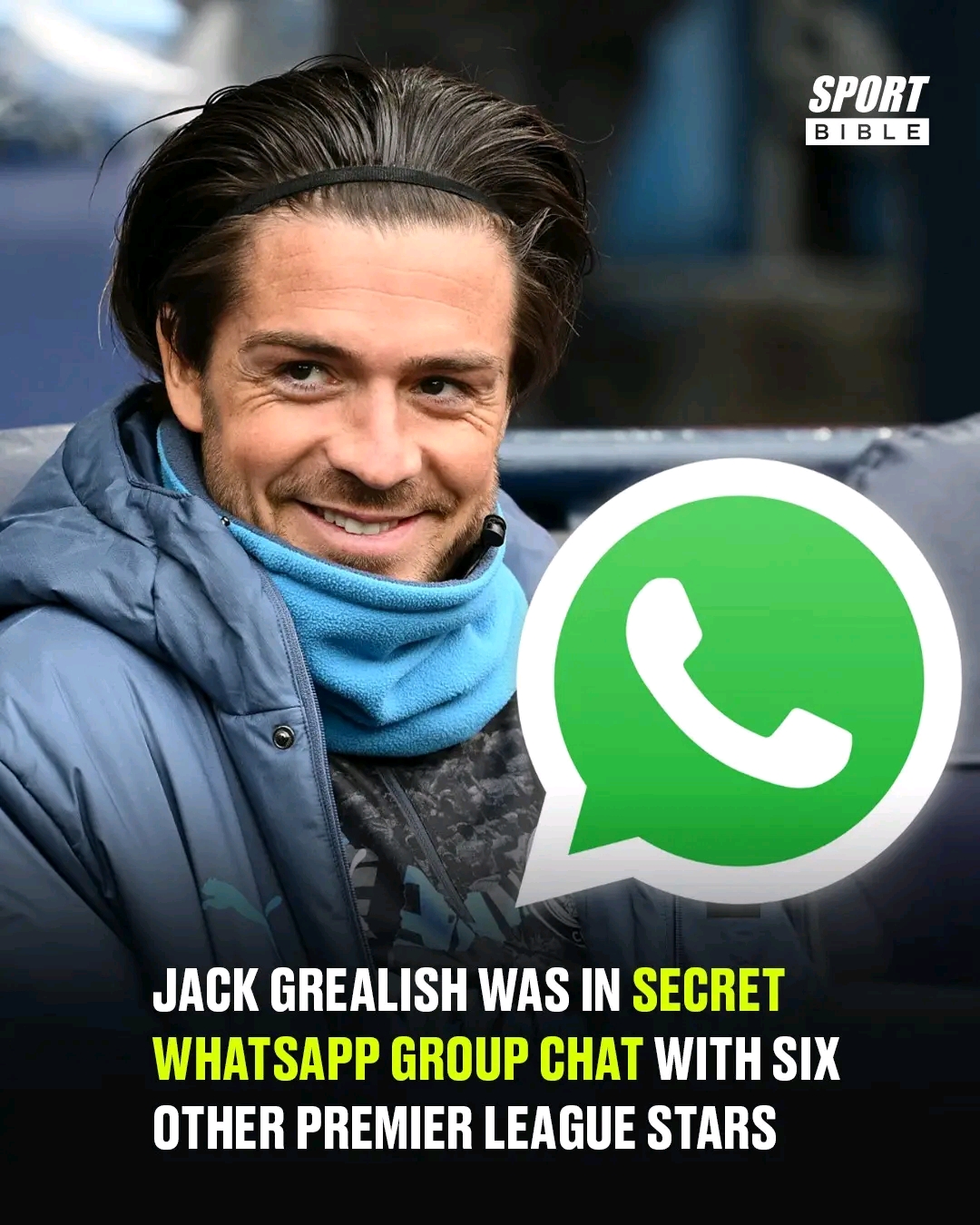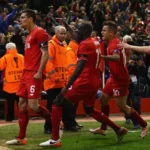Jack Grealish was in secret WhatsApp group called ‘The Avengers’ with five other Premier League stars

In the cutthroat world of Premier League football, where rivalries run deep and club loyalties are paramount, the existence of genuine friendships between players from different teams often remains hidden from public view. However, one revelation has provided a fascinating glimpse into the personal relationships that transcend club boundaries – Jack Grealish’s membership in a secret WhatsApp group aptly named ‘The Avengers.’
The story of ‘The Avengers’ WhatsApp group begins in 2020, during one of the most turbulent periods in modern football history. As the COVID-19 pandemic forced the world into lockdown and football schedules were thrown into chaos, six Premier League stars found solace in digital communication that would evolve into something far more meaningful than casual conversation.
Jack Grealish, then Aston Villa’s captain and talisman, found himself at the center of a unique friendship circle that included some of the most promising English talents in the Premier League. The group consisted of Tottenham Hotspur’s creative midfielder James Maddison, Aston Villa teammates Ross Barkley and John McGinn, former England international Dele Alli (now at Como), and Chelsea’s versatile defender Ben Chilwell.
The timing of this group’s formation speaks volumes about the isolation and uncertainty that players were experiencing during the pandemic. While fans saw their heroes performing on television screens, behind the scenes, these young men were navigating the same feelings of disconnection and anxiety that affected millions around the world. The WhatsApp group became their sanctuary – a place where they could be themselves, away from the pressures of professional football and media scrutiny.
The group’s name has an interesting origin story that Grealish himself revealed during a 2021 interview with UMM. The moniker ‘The Avengers’ was coined during a winter break trip to Dubai, a popular destination for Premier League players seeking respite from the demanding English football calendar.
“It was when we went to Dubai last year on that winter break,” Grealish explained, his characteristic honesty shining through. “Have you watched the film Avengers? I haven’t. But that’s like loads of people or something, like a group? I didn’t even know that (the Avengers film is an elite group of individuals). I don’t even know who put it together actually.”
This admission perfectly encapsulates Grealish’s unpretentious nature – here was a group of elite footballers who had inadvertently named themselves after one of the most successful superhero franchises in cinema history, yet the man who revealed the name hadn’t even seen the films. The irony wasn’t lost on fans, who found the revelation both endearing and amusing.
The Dubai trip itself represents a significant moment in modern football culture. As players increasingly seek experiences beyond the traditional boundaries of their sport, these international getaways have become opportunities for bonding that transcend club rivalries. In Dubai’s luxury resorts and exclusive venues, Grealish and his friends could escape the constant scrutiny of English media and simply enjoy each other’s company.
Perhaps the most revealing insight into the group’s dynamics came from Grealish’s description of each member’s WhatsApp habits. His observations paint a picture of distinct personalities within the collective, each bringing their own communication style to the digital brotherhood.
“Me or Madders,” Grealish identified as the most vocal members when asked during the UMM interview. “On that point (Maddison) is on the group chat 24/7. Someone writes in it and then bam, he’s ready straight away. Constantly in there.”
James Maddison’s hyperactive presence in the chat aligns perfectly with his on-field persona – energetic, creative, and always looking to make something happen. The Leicester City midfielder, known for his quick wit and social media savvy, appears to serve as the group’s digital catalyst, keeping conversations flowing and ensuring the connection remains strong.
The contrast with other members is equally telling. “Then there’s people like Chilly (Ben Chilwell), he’d be online and he wouldn’t read it,” Grealish noted with apparent amusement. This observation reveals Chelsea’s left-back as the group’s more reserved member, perhaps reflecting the pressure and expectations that come with playing for one of England’s biggest clubs.
These behavioral patterns within the group chat mirror the complexities of maintaining friendships in professional football. While some players thrive on constant communication and banter, others prefer a more measured approach, contributing when they feel compelled rather than maintaining a constant presence.
Each member of ‘The Avengers’ has taken a different path since the group’s formation, with their careers reflecting the unpredictable nature of modern football. Understanding these individual journeys provides context for how the friendship group has evolved and adapted to changing circumstances.
Jack Grealish himself represents perhaps the most dramatic transformation within the group. His £100 million transfer from Aston Villa to Manchester City in 2021 made him the most expensive British player in history, yet his time at the Etihad has been marked by inconsistency and, more recently, exclusion from key squads. The creative midfielder who once carried Aston Villa single-handedly has struggled to find his place in Pep Guardiola’s intricate tactical system.
The contrast between Grealish’s Villa days and his City experience highlights the challenges that come with big-money moves. At Villa Park, he was the undisputed star, the player around whom everything revolved. At City, he became just one piece in a complex puzzle, required to adapt his natural game to fit Guardiola’s specific demands. This transition has clearly taken its toll, with the player’s confidence and joy appearing to diminish over time.
James Maddison has experienced his own rollercoaster journey, moving from Leicester City to Tottenham Hotspur in a deal that promised to unlock his full potential. Known for his creative brilliance and set-piece expertise, Maddison represents the modern English attacking midfielder – technically gifted, tactically intelligent, and blessed with the vision to change games with a single pass.
His move to Spurs was seen as an opportunity to showcase his talents on a bigger stage, yet the transition hasn’t been without its challenges. The pressure of living up to expectations at a club with Champions League ambitions has tested Maddison’s mental resilience, making his friendship group even more valuable as a source of support and perspectivRoss Barkley and
John McGinn remain at Aston Villa, providing continuity within the group as the club has transformed under Unai Emery’s guidance. Barkley’s journey back to relevance after struggling spells at Chelsea and Everton demonstrates the importance of finding the right environment for individual success. McGinn, meanwhile, has established himself as one of the Premier League’s most consistent and underrated midfielders.
Ben Chilwell’s career at Chelsea has been marked by both triumph and frustration. A key player in the club’s Champions League victory, he has also endured injury setbacks and periods of uncertainty that have tested his resolve. His quieter presence in the WhatsApp group perhaps reflects the mental challenges that come with high-level football.
Dele Alli represents the group’s most dramatic fall from grace. Once considered one of England’s brightest prospects, his move to Como in Serie A follows a period of decline that saw him struggle for relevance at Tottenham and later Everton. His inclusion in the group provides a sobering reminder of how quickly careers can change in modern football.
The existence of ‘The Avengers’ group chat illuminates broader themes about friendship and mental health in professional football. In an era where players are increasingly open about psychological challenges, these support networks serve crucial functions that extend far beyond casual conversation.
Modern footballers face unprecedented pressures. Social media scrutiny, massive transfer fees, and constant media attention create environments where genuine human connection becomes both rare and precious. The WhatsApp group provides a safe space where these players can express vulnerabilities, share experiences, and maintain perspective during difficult periods.
The timing of the group’s formation during the COVID-19 pandemic adds another layer of significance. As the world grappled with isolation and uncertainty, professional footballers found themselves in unique positions – continuing to perform while separated from normal social interactions. The digital brotherhood became a lifeline, maintaining human connection during an inhuman time.
Research in sports psychology consistently emphasizes the importance of social support systems for athlete mental health. The pressures of professional sport can lead to anxiety, depression, and identity crises, particularly when careers don’t unfold as expected. Having peers who understand these challenges provides invaluable emotional support that families and agents, despite their best intentions, cannot fully replicate.
As of June 2025, Jack Grealish finds himself at perhaps the most crucial juncture of his career. His exclusion from Manchester City’s Club World Cup squad sent shockwaves through the football world, effectively confirming what many had suspected – his time at the Etihad Stadium was drawing to a close.
The situation represents a dramatic fall from grace for a player who, just a few years ago, was considered one of England’s most exciting talents. His performances for Aston Villa had made him a household name, his distinctive playing style and charismatic personality making him a fan favorite across the country. The move to City was supposed to elevate him to the next level, providing the platform to showcase his talents on the biggest stages.
Instead, Grealish has found himself struggling to adapt to Guardiola’s demanding tactical requirements. The Catalan manager’s preference for positional discipline and collective responsibility has clashed with Grealish’s natural inclination toward individual expression and creative freedom. While City have continued to win trophies, Grealish’s contributions have often felt peripheral rather than central
The exclusion from the Club World Cup squad was perhaps the final straw, a clear indication that Guardiola no longer considers him integral to his plans. For a player accustomed to being the star, this relegation to squad player status has clearly taken its toll on his confidence and motivation.
Rio Ferdinand’s recent comments about Grealish’s situation provide valuable insight from someone who understands the pressures of elite football. The former Manchester United defender’s advice carries weight due to his own experiences of triumph and disappointment at the highest level.
“He needs to find happiness with himself playing football, but also within a team,” Ferdinand observed during his YouTube channel appearance. This statement cuts to the heart of Grealish’s current predicament – the conflict between personal fulfillment and professional achievement.
Ferdinand’s emphasis on happiness reflects a growing understanding in football about the importance of mental well-being for peak performance. Players who are fulfilled and confident in their roles inevitably perform better than those who feel marginalized or undervalued, regardless of the trophies their clubs might win.
“I don’t think any players are happy when they’re not playing, especially the player that’s used to being the star man in their team since he was a kid,” Ferdinand continued. This observation highlights the psychological adjustment required when moving from being a big fish in a small pond to a smaller fish in a larger pond.
The transition from Villa to City required Grealish to fundamentally reassess his role and identity as a player. At Villa, everything ran through him – he was the creative hub, the player teammates looked to for inspiration, the fan favorite who could single-handedly change games. At City, he became just one component in a well-oiled machine, expected to follow instructions rather than improvise solutions.
Recent speculation linking Grealish with a move to Everton has captured public attention, not least because of the potential involvement of his ‘Avengers’ connections. While none of his WhatsApp group friends currently play for Everton, the network of relationships in football often influences transfer decisions in subtle ways.
The prospect of Grealish joining Everton represents an intriguing possibility for multiple reasons. The Merseyside club’s tradition of nurturing creative players and providing platforms for individual expression could suit Grealish’s playing style far better than City’s rigid tactical framework. Moreover, the pressure would be different – while expectations would remain high, they wouldn’t carry the same intensity as those at a club challenging for the Champions League every season.
A move to Everton would also allow Grealish to rediscover his love for the game, something that Ferdinand identified as crucial for his future success. The opportunity to be a key player again, to have tactical systems built around his strengths rather than requiring him to suppress his natural instincts, could reignite the spark that made him such an exciting prospect.
The disclosure of the WhatsApp group has had implications beyond mere entertainment value. It has humanized these elite athletes, showing them as young men maintaining friendships despite the competitive nature of their profession. In an era where football can feel increasingly commercialized and distant from fans, these glimpses of authentic human connection resonate strongly.
L
The revelation also challenges traditional narratives about rivalry in football. While clubs may compete fiercely, the players themselves often maintain respect and friendship across team boundaries. This reality reflects the cosmopolitan nature of modern football, where players’ careers frequently involve moves between clubs and countries.
For younger players and fans, the example of ‘The Avengers’ demonstrates the importance of maintaining relationships and support systems throughout career ups and downs. The message that even elite athletes need friends and emotional support challenges outdated notions of stoic masculinity in sport
As Grealish contemplates his next move, the support of his ‘Avengers’ friends will likely prove invaluable. These relationships, forged during good times and tested during difficulties, represent continuity in a career marked by dramatic changes.
Whether he chooses Everton, returns to Aston Villa, or explores other options, Grealish’s next destination will need to provide more than just playing time. He needs an environment where he can rediscover his joy in football, where his creativity is celebrated rather than constrained, and where he can once again become the player who captivated English football.
The story of ‘The Avengers’ WhatsApp group ultimately reminds us that beneath the glamour, pressure, and scrutiny of professional football, these are human beings navigating the same fundamental needs for friendship, support, and belonging that affect us all. As Grealish writes the next chapter of his career, he does so knowing that whatever happens, he has a group of friends who understand his journey and will support him regardless of which shirt he wears.
The bonds formed in that Dubai winter break and maintained through digital communication may prove to be more valuable than any trophy or transfer fee. In a sport where careers can change overnight and loyalty is often questioned, the enduring friendship of ‘The Avengers’ represents something genuinely authentic in an increasingly manufactured world.
As the summer transfer window progresses and Grealish’s future becomes clearer, one thing remains certain – whatever path he chooses, he won’t be walking it alone. The Avengers, assembled by chance and strengthened by shared experience, will continue to provide the support and perspective that only true friends can offer.















